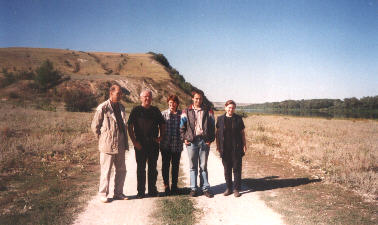
TECHNICAL DETAILS
The following people took part in the expedition of
August-September 1999: Prof. Christian Sappok (Bochum), Prof. L.L. Kasatkin
(Moscow), Dr. E. Moshkina (Kirov), Dr. Marion Krause (Bochum), D. Savinov
(Moscow). The expedition was financed by a project grant from the DFG
(German Research Association), project number 278/13-1.
|

The expedition's participants:L.
Kasatkin, Ch. Sappok, M. Krause, D. Savinov, E. Moshkina
|
We met in Moscow and took the train to Sebryakovo, which
is what the train-station in Mikhailovka is called up to the present day. Mikhailovska
was the starting point and end-point of our expedition. From here, we drove
to Uryupinsk, which is a synonym for isolation, provinicialism, and backwardness
in Russian. Many a contemporary doesn't even know that the town actually exists,
only having heard about it in jokes. In Uryupinks, there is a campus of the
University of Volgograd. Its administrations and employees lent their generous
support to our undertaking.
Our next stop was the neighbouring area of Nekhayevski.
Here, the situation seemed difficult at first: the area obviously had even greater
economic problems than its neighbour, and the renewal of Cossack culture was
not received by everyone with enthusiasm. And now: guests! But we still received
the necessary support from the local administration, especially from the authorities
for education and culture: we were provided with a mini-van, a place to stay
and food to eat.
After this sojourn, our journey led
us south into the Serafimovich area to the former stanitsa Ust-Medveditskaya,
where we camped in Ust-Khopyorskaya. We were allotted what used to be the pope's
house, which had served as a kindergarten and a hotel in the meantime because
of its spacious rooms. Here, we were able to take care of ourselves rather well:
the village had two shops. Besides, we were also frequently given presents of
fresh fruit and vegetables. We had rented the mini-van of the university campus
in Mikhailovska; Kolya, the driver, already knew the way the expedition worked
from the year before and was an invaluable support once again.
Our last goal was the Kletski ara. We decided to live in
the stanitsa Raspopinskaya and received unbureaucratic and speedy assistance
from the mayor. The director of the local school put one of the school's secondary
building to our disposal and also supplied us with some cutlery and a electric
range. For the children and the teacher, we were obviously an interesting and
welcome change to the routine of school. A little demonstration of our dialectological
work in the school auditorium could hardly be avoided; we also signed a autogram
for the school chronology. Which other dialectologist can claim that he has
been the victim of autogram hunter ?!
The expedition's
protocol offers an overview of the places where we made recordings and of
our informants.
Marion Krause
Last update: 18.5.2000

